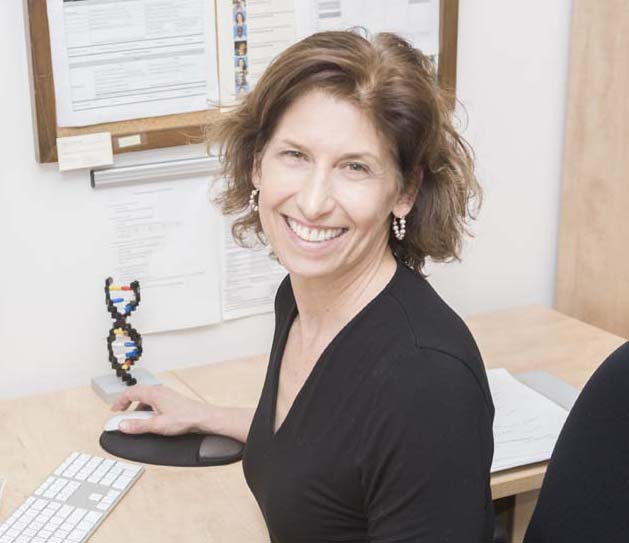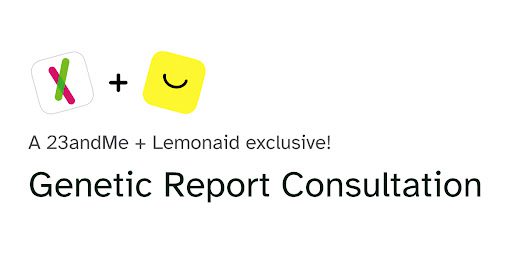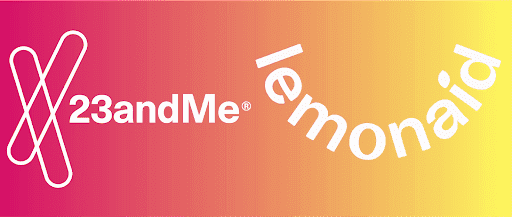By Brianne Kirkpatrick, MS, LCGC
In the fall of 2021, 23andMe announced its acquisition of Lemonaid Health, an online service that includes clinicians with unique knowledge and training in genetics-informed care. The latest news to come from this development is a new service, which will offer genetic report consultations for 23andMe Health + Ancestry customers, including 23andMe+ members.
As a genetic counselor working in the ancestry and at-home testing space, you might imagine I had a lot of questions about this! So I spoke with Anne Greb, Director, Clinical Genetics and Education, to learn more.

Virtual Consultation
The first question I had for Anne was about the nature of a consultation with a Lemonaid Health provider in connection with this new service. Would it be the same as genetic counseling? I learned that while it would not replace genetic counseling, there are certain aspects of a virtual consultation with a provider from Lemonaid Health that overlaps with the work of licensed and certified genetic counselors.

As part of the genetic report consult service, Lemonaid Health primary care providers will offer consultations to help customers understand the role genes play in their health, within the context of their health history and overall risks. A Lemonaid Health clinician might review family health history information, for example, as it relates to the genetic testing or condition the customer brought forward as their main concern. This means asking questions about family health history based on the reason for the consultation and identifying red flags which may indicate an increased risk for a genetic condition in the family. When an increased risk is suspected, a three-generation pedigree will be taken, including information about relatives at the level of grandparent, aunt, uncle, cousin, parent, sibling, and children. This extra information can be incredibly important in identifying certain risks known to have a genetic component, such as certain types of cancer and cardiovascular disease.
Genetics 101
Anne explained that consultations center on discussing basic genetic concepts related to genetic disease and inheritance–for example, whether a condition is recessive or dominant and what that may mean for family members. Addressing other immediate concerns of the customer, such as genetic privacy protections, risks to other family members, and recommended next-steps are other key pieces to the consultation. The Lemonaid Health provider will also discuss options for additional genetic testing, which is an important piece of taking action in diagnosis, treatment, and prevention of many chronic diseases.
I also learned that state of residence would not be an issue. Lemonaid Health has providers licensed to practice in all 50 U.S. states. And this led to another question: can any person who has tested at 23andMe have this? Right now, the providers are prepared to address the first three genetic health risk reports mentioned earlier with eligible patients, and the plan is to expand that list over time.
Customers with questions about certain reports will see a banner (or link) in their dashboard informing them of the new service and what it offers. Starting with a few genetic health risk reports (MUTYH-Associated Polyposis, BRCA1/BRCA2 (Selected Variants), and Familial Hypercholesterolemia)*, the list of conditions and reports customers can discuss with a Lemonaid Health provider will grow over time.
Training
Since becoming a part of the 23andMe family, Lemonaid Health clinicians have participated in additional training around genetic information and how to factor this into patient care and disease prevention. Their training started with the conditions associated with the first three reports (hereditary breast and ovarian cancer, familial hypercholesterolemia, and MUTYH-associated polyposis) and continues with ongoing education. This type of education for health care providers will help genetics become more integrated into preventative care.
Scheduling with a Lemonaid Health provider takes an extra step to set up and is a self-pay service. Choice is always an important aspect for anyone who has a genetic test. I asked Anne what value she sees from the Lemonaid Health consultations.
“As genetic counselors, we highly value the ability to find, process, and understand health information and to use that information to make healthcare decisions,” she explained. “It’s important to appreciate that everyone has a different learning style and therefore approaches navigating health information in different ways.“
Customers who want to seek out more information about their three (3) genetic health risk reports might choose to schedule a consultation with a Lemonaid Health provider, or they might instead take a different route, such as exploring online learning materials already available at 23andMe. One example is the educational page on the BRCA1 and BRCA2 genes, Do You Speak BRCA? Customers can also explore the various sections of their genetic health risk report, which include information about the condition, gene, and variants tested, links out to research underlying the report, and answer frequently asked questions.
When the opportunities for understanding genetic results expand, barriers drop to accessing and making use of the information gained from genetic testing. The combined services of Lemonaid Health and 23andMe give 23andMe customers another way to take the next step when it comes to using genetic information in their lives and health care. That is a situation in which everyone benefits.
Brianne Kirkpatrick is a genetic counselor and DNA consultant. She is the founder of Watershed DNA and the author of the book DNA Guide for Adoptees. An alumnus of Indiana University and Northwestern University, Brianne is a member of the National Society of Genetic Counselors, American Board of Genetic Counseling, American Counseling Association, and International Society of Genetic Genealogy. She lives in Crozet, Virginia with her husband and their three children.
*The 23andMe PGS test uses qualitative genotyping to detect select clinically relevant variants in the genomic DNA of adults from saliva for the purpose of reporting and interpreting genetic health risks. It is not intended to diagnose any disease. Your ethnicity may affect the relevance of each report and how your genetic health risk results are interpreted. Each genetic health risk report describes if a person has variants associated with a higher risk of developing a disease, but does not describe a person’s overall risk of developing the disease. The test is not intended to tell you anything about your current state of health, or to be used to make medical decisions, including whether or not you should take a medication, how much of a medication you should take, or determine any treatment. Warnings & Limitations: The 23andMe PGS Genetic Health RIsk Report for BRCA1/BRCA2 (Selected Variants) is indicated for reporting of the 185delAG and 5382insC variants in the BRCA1 gene and the 6174delT variant in the BRCA2 gene. The report describes if a woman is at increased risk of developing breast and ovarian cancer, and if a man is at increased risk of developing breast cancer or may be at increased risk of developing prostate cancer. The three variants included in this report are most common in people of Ashkenazi Jewish descent and do not represent the majority of BRCA1/BRCA2 variants in the general population. This report does not include variants in other genes linked to hereditary cancers and the absence of variants included in this report does not rule out the presence of other genetic variants that may impact cancer risk. The PGS test is not a substitute for visits to a healthcare professional for recommended screenings or appropriate follow-up. Results should be confirmed in a clinical setting before taking any medical action. For important information and limitations regarding each genetic health risk report click here.



